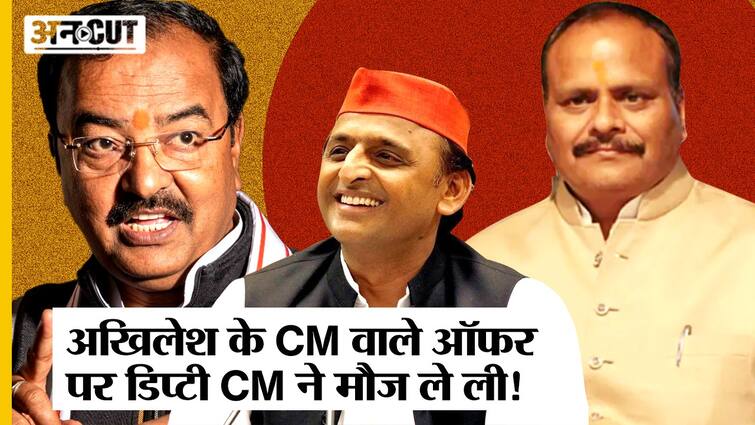


The ongoing feud between Uttar Pradesh Chief Minister Yogi Adityanath and his deputy Keshav Prasad Maurya was on full display at a BJP OBC Morcha meeting. Both Maurya and the other deputy Brajesh Pathak left the venue before the CM's arrival, while Maurya used his brief address to criticize the government and highlight the importance of party workers in winning elections. Adityanath, meanwhile, recognized the strength of Other Backward Castes in the state and slammed the Samajwadi Party for their alleged embrace of mafia leaders.
OBC with Yogi: A Deeper Look into the Rift within the BJP in Uttar Pradesh
The recent events at a BJP OBC Morcha meeting have highlighted the ongoing tension between Uttar Pradesh Chief Minister Yogi Adityanath and his deputy Keshav Prasad Maurya. This feud has been simmering for some time and has now come to the fore.
Background:
Keshav Prasad Maurya, an OBC leader, was appointed as the Deputy Chief Minister of Uttar Pradesh in 2017 after the BJP's victory in the state assembly elections. Maurya has been a vocal critic of Yogi Adityanath's policies and has often expressed his dissatisfaction with his position in the government.
The tension between Adityanath and Maurya escalated in 2022 when the latter was sidelined during the BJP's campaign for the Uttar Pradesh assembly elections. Maurya was not given a prominent role in the campaign and was largely ignored by the party leadership.
Recent Events:
The OBC Morcha meeting on February 26, 2023, was a flashpoint in the feud between Adityanath and Maurya. Both Maurya and the other deputy, Brajesh Pathak, left the venue before the CM's arrival. Maurya used his brief address to criticize the government and highlight the importance of party workers in winning elections.
Adityanath, on the other hand, recognized the strength of Other Backward Castes (OBCs) in the state and slammed the Samajwadi Party for their alleged embrace of mafia leaders.
Significance:
The recent events have highlighted the deep divisions within the BJP in Uttar Pradesh. Maurya's actions are seen as a challenge to Adityanath's authority and could potentially destabilize the government. The OBC community, which constitutes a significant vote bank in the state, is also likely to be watching these developments closely.
Top 5 FAQs and Answers:
1. What is the feud between Yogi Adityanath and Keshav Prasad Maurya about?
Answer: The feud stems from Maurya's dissatisfaction with his position in the government and his belief that he is not being given enough importance by the CM.
2. What are the specific criticisms that Maurya has raised against the government?
Answer: Maurya has criticized the government's handling of the COVID-19 pandemic, the law and order situation, and the alleged neglect of OBCs.
3. Why did Maurya leave the OBC Morcha meeting before Adityanath's arrival?
Answer: Maurya left the meeting to express his protest against the CM's alleged lack of respect for party workers and OBC leaders.
4. What is the response of the BJP leadership to the feud?
Answer: The BJP leadership has taken a neutral stance and has not publicly commented on the matter. However, it is likely that efforts are being made behind the scenes to resolve the conflict.
5. What are the potential consequences of the feud?
Answer: The feud could potentially destabilize the BJP government in Uttar Pradesh and damage the party's prospects in future elections. It could also alienate OBC voters, who form a significant vote bank in the state.

In a strongly worded statement, politician Shashi Tharoor expressed his opposition to the VB-G RAM G Bill that aims to replace MNREGA. Tharoor argued that the removal of Mahatma Gandhi's name from the scheme goes against its core values and also criticized other proposed changes such as financial alterations and a shift of responsibility to states. The politician believes that the Bill poses a threat to the principles of federalism and that the scheme should not be made subject to executive notification.

Union Minister Shivraj Singh Chouhan introduced the Viksit Bharat - Guarantee for Rozgar and Ajeevika Mission (Gramin): VB-G RAM G Bill, 2025 in the Lok Sabha. The bill aims to establish a new rural development framework aligned with the national vision of Viksit Bharat @2047 and seeks to provide a statutory guarantee of 125 days of wage employment to each rural household. The government is determined to pass the bill in this parliamentary session and failure to do so could complicate budgetary provisions.

In a significant move to improve academic standards, India's new Viksit Bharat Adhishthan Bill, 2025, places student feedback at the heart of higher education accreditation. Union Education Minister Dharmendra Pradhan, citing the National Education Policy 2020, announced that for the first time, students will have a direct impact on accreditation outcomes. The new framework will also increase institutional autonomy and encourage innovation, but with a strong emphasis on accountability through transparent student-led evaluations. The consolidation of regulators and accreditation bodies aims to streamline and strengthen the quality of higher education in India.

On the occasion of Vijay Diwas, a day commemorating India's 1971 victory over Pakistan, Rahul Gandhi, Leader of Opposition in Lok Sabha, paid his respects to the brave soldiers who showed indomitable courage, leading to the liberation of East Pakistan and the formation of Bangladesh. The date also marks the surrender of 93,000 Pakistani soldiers to the Indian Armed Forces and is a tribute to the bravery and sacrifice of Indian soldiers. Congress National President Mallikarjun Kharge also highlighted the 1971 victory as a great example of humanity and justice under the leadership of then Prime Minister Indira Gandhi.

Senior Congress leaders respond to Delhi court's refusal to take ED's chargesheet in the National Herald-Young Indian case, emphasizing the lack of evidence and foundation of the case. They accuse the BJP of exaggeration and targeting the opposition, claiming that the ruling has validated their long-held belief that the case is politically motivated. Congress leader Abhishek Manu Singhvi highlights the legality and commonality of corporate restructuring, while Congress general secretary K.C. Venugopal condemns the Modi government's targeting of Sonia Gandhi and Rahul Gandhi without any legal basis.

The Congress party declared a moral and legal triumph after the Delhi court dismissed the Enforcement Directorate's chargesheet in the National Herald-Young Indian case. The judge noted that the chargesheet was based on a private complaint rather than an FIR, making it legally inadmissible. The Congress accused the Modi government of maliciously targeting its leaders and misusing central agencies for political gain. They vowed to continue fighting for truth and democratic rights, asserting that nothing could deter them from their mission.

India commemorates Vijay Diwas every year on December 16 to honour the soldiers who sacrificed their lives during the 1971 war with Pakistan, which resulted in the creation of Bangladesh. As part of this year's celebrations, the Indian Army displayed a reconstructed Turkish armed drone, Yiiha, which was shot down by India during Operation Sindoor on May 10. The Kamikaze class of drones, also known as "suicide drones," were used by Pakistan to target Indian military and civilian installations, but were almost all destroyed by the Indian military.

India celebrates the 54th Vijay Diwas, honoring the bravery and sacrifice of its soldiers in the 1971 war that led to the liberation of Bangladesh. Political leaders, including Prime Minister Narendra Modi and President Droupadi Murmu, pay glowing tributes to the armed forces and their unmatched courage. The Army marks the occasion by recalling the historic triumph and the flawless coordination between different branches of the military, with an impressive Military Tattoo in Kolkata.

Renowned spiritual leader and former BJP MP, Ram Vilas Vedanti, passed away at the age of 67 due to a heart attack. Known for his significant role in the Ram Janmabhoomi movement, Vedanti had been admitted to a hospital in Rewa for a blood infection and low blood pressure. Attempts to transport him to a better medical facility were unsuccessful due to bad weather. Political leaders, including Uttar Pradesh Chief Minister Yogi Adityanath, expressed their condolences and praised Vedanti's contributions to society.

Indian Ambassador to the United Nations, Harish P, slammed Pakistan for misusing international platforms for its hostile agenda against India at the UNSC Open Debate on “Leadership for Peace”. He objected to Pakistan’s reference to Jammu and Kashmir and questioned its democratic credentials while reaffirming India’s stance on cross-border terrorism. This reflects the ongoing strain in India-Pakistan relations and New Delhi’s determination to counter any attempt by Islamabad to internationalise bilateral disputes.